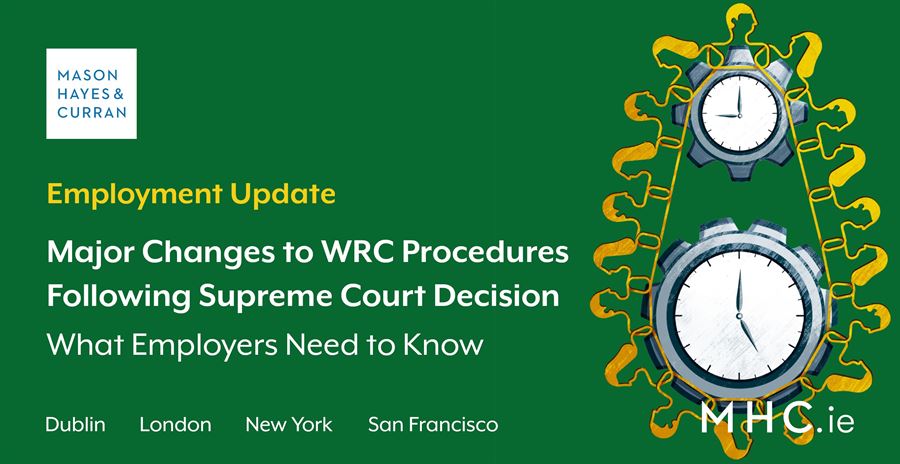
We previously outlined that the Supreme Court had determined that the activities of the Work Relations Commission (WRC) constituted the administration of justice. Consequently the blanket requirement that WRC hearings take place in private and the inability of the WRC to take evidence on oath/affirmation, and for there to be no penalty for the giving of false evidence, was unconstitutional.
We look at the impact of the Supreme Court decision on the processes adopted by the WRC.
WRC hearings now held in public
In the ordinary course of business, members of the public, including members of the media, will be permitted to attend WRC hearings.
While guidance from the WRC currently does not expressly reference listings of hearings, we understand that parties to a hearing will be named on the WRC website in its list of upcoming hearings. Parties’ names will also be published in WRC decisions following the determination by the Adjudication Officer (AO).
Taking of evidence on oath
AO’s will have the power to take evidence on oath, and hearings may be adjourned until the legislation granting this power is enacted.
Impact of COVID-19 on public access to WRC hearings
Due to current COVID-19 restrictions, the WRC is only permitted to hold remote hearings at present. If a member of the public or media wants access to a remote hearing, they must submit an email to the WRC requesting to attend, and the WRC will then share the WebEx link with that person. If the numbers wishing to attend is significant and this has an impact on the quality of the IT connection, then the AO can limit the number of external parties in attendance.
Parties’ named in WRC list of upcoming hearings
As a consequence of the requirement for hearings to be held in public, we understand that parties’ names will now appear on the WRC list of upcoming hearings. This schedule is found on the WRC website and is updated on a weekly basis. Members of the public will have access to this list which we understand is likely to follow the format of the Labour Court list which outlines the parties’ names and the specific legislation under which the claim is being heard.
Parties not anonymised in WRC decisions
A further consequence of the ‘public’ requirement is that WRC decisions will be published with the names of the parties included. Where a complaint has had its final hearing before or on 6 April 2021, the determination of the AO will still be anonymised. However, if the final hearing takes place after 6 April 2021, the names of the parties will no longer be anonymised.
Hearings adjourned if evidence to be taken on oath
Where an AO determines that there is a serious and direct conflict of evidence between the parties to a complaint before him/her, or one emerges in the course of the hearing, the AO will adjourn the hearing until the legislation granting Adjudication Officers the power to administer an oath is enacted.
Right to cross examine
There has always been the right to cross-examine witnesses before the WRC, and this position has not changed.
Do these procedural changes apply to all hearings?
No – these changes do not apply to industrial relations disputes which will continue to be heard in private. The changes outlined above only apply where the investigation or hearing amounts to the ‘administration of justice’ which occurs in most employment and equality rights claims.
Equally, WRC mediation is unaffected by the WRC procedural changes and remains an option in all cases submitted for adjudication and will continue to be entirely confidential.
Conclusion
Clients should be aware that WRC hearings are no longer held in private, apart from industrial relations disputes. It is our understanding that parties’ names will now appear on the WRC listing. WRC decisions will contain the names of all parties. If parties are concerned about information being disseminated about their dispute this might lead to earlier settlement and/or a move towards confidential mediation as a mechanism for resolving disputes.
Clients should also be aware that for live WRC cases unless a postponement is granted in advance, all scheduled hearings will commence in the normal manner and proceed to conclusion subject to the requirement that it will be necessary to adjourn where an AO concludes that it is necessary that an oath be administered.
For more information on the likely impact of these new measures, contact a member of our Employment & Benefits team.
The content of this article is provided for information purposes only and does not constitute legal or other advice.





